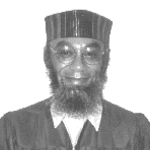The Case
On December 10, 2002, the U.S. Supreme Court dismissed without deciding the case of Abu-Ali Abdur’Rahman, who is on death row in Tennessee. The Court heard arguments in the case on November 6, 2002, but declined to issue a ruling. Justice Stevens dissented from the order, stating:
He has argued that the evidence already presented to the court proves that the prosecutor was guilty of serious misconduct; that affidavits executed by eight members of the jury that sentenced him to death establish that they would have not voted in favor of the death penalty if they had known the facts that the prosecutor improperly withheld or concealed from them; and that it is inequitable to allow an erroneous procedural ruling to deprive him of a ruling on the merits. In this Court, a brief filed by former prosecutors as amici curae urges us to address the misconduct claim, stressing the importance of condemning the conduct disclosed by the record. Arguably it would be appropriate for us to do so .…
(Abdur’Rahman v. Bell, 537 U.S. 88 (2002) (Stevens, J., dissenting from dismissal),
Prior to the Courts grant of certiorari, a lower court ruled that it was too late for Abdur’Rahman to present new evidence in federal court. Abdur’Rahman’s petition for certiorari asked the court to consider: (1) whether the Sixth Circuit erred in holding, in square conflict with decisions of the Supreme Court and of other circuits, that every Rule 60(b) Motion constitutes a prohibited “second or successive” habeas petition as a matter of law, and (2) whether a court of appeals abuses its discretion in refusing to permit consideration of a vital intervening legal development when the failure to do so precludes a habeas petitioner from ever receiving any adjudication of his claims on the merits. (Associated Press, 4/22/02)
On October 21, 2002, the Supreme Court granted the motion of respondent and Alabama, as amicus curiae, for divided argument and for leave to participate in the oral argument as amicus curiae.
On October 24, the parties were directed to file supplemental briefs addressing the following questions on or before 3 p.m., Thursday, October 31, 2002: “Did the Sixth Circuit have jurisdiction to review the district court’s order, dated November 27, 2001, transferring Petitioner’s Rule 60(b) Motion to the Sixth Circuit pursuant to 28 U.S.C. 1631? Does this Court have jurisdiction to review the Sixth Circuit’s order, dated February 11, 2002, denying leave to file a second habeas corpus petition?”
Legal Links for More Information in this Case

UPDATE: (2011) The Sixth Circuit (2 – 1) denied Abdur’Rahman’s Brady claims included in his Rule 60(b) motion, holding that any evidence that was withheld by the prosecution was not material, i.e., it would not have undermined confidence in the original sentencing verdict. Abdur’Rahman v. Colson, No. 09 – 5307 (Aug. 17, 2011). The court upheld the District Court’s ruling. Judge Cole dissented, concluding, “Whatever your take on the merits of Abdur’Rahman’s claims, one thing about this case is undeniable: the prosecutor desecrated his noble role. He failed grossly in his duty to act as ‘the representative … of a sovereignty … whose interest … in a criminal prosecution is not that it shall win a case, but that justice shall be done.’ Berger v. United States, 295 U.S. 78, 88 (1935). Abdur’Rahman may face the ultimate penalty as a result; Justice will bear a scar.”
UPDATE: (2007) In 2004, the Sixth Circuit en banc court concluded that Abu-Ali Abdur’Rahman’s post-judgment motion should be treated as a Fed. R. Civ. P. 60(b) motion rather than a second or successive habeas petition. However, in 2005, the U.S. Supreme Court granted certiorari, vacated the Sixth Circuit’s judgment, and remanded in light of Gonzalez v. Crosby. Based on Gonzalez, Abdur’Rahman’s motion was treated as a motion pursuant to Rule 60(b), not a second or successive habeas petition. However, on July 13, 2007, the Sixth Circuit (2 – 1) on remand dismissed his motion as untimely. As of October 2010, Abdur’Rahman remained on Tennessee’s death row.
See In re Abdur’Rahman, 392 F.3d 174, 182 (6th Cir. 2004), vacated by Bell v. Abdur’Rahman, 545 U.S. 1151 (2005).
UPDATE: (2005) The Tennessee Supreme Court held that the state’s lethal injection process does not amount to cruel and unusal punishment. See Abu-Ali Abdur’Rahman v. Bredesen et al. (Oct. 17, 2005) (The Chattanoogan, Oct. 17, 2005).
UPDATE: (2004) Abdur’Rahman v. Bell, No. 02 – 6547/6548, On December 13, 2004, the U.S. Court of Appeals for the Sixth Circuit held that a Rule 60(b) motion does not automatically amount to a prohibited successive habeas petition. Rule 60(b) of the Federal Rules of Civil Procedure provides that in some instances an applicant may file a motion to reconsider a previous ruling of the court. The Sixth Circuit ruled that a Rule 60(b) motion should only be barred when the motion constitutes a direct challenge to the constitutionality of the underlying conviction. In this case, Abdur’Rahman’s Rule 60(b) motion attacks the manner in which the district court’s earlier habeas judgment was reached. Because Abdur’Rahman’s motion does not constitute a direct challenge to the constitutionality of his conviction, the Sixth Circuit ruled it is not a successive habeas petition. The Sixth Circuit reversed the district court’s denial of Abdur’Rahman’s motion for relief from the district court’s earlier judgment denying his petition for a writ of habeas corpus, and remanded the case for consideration of Abdur’Rahman’s claim challenging the procedural basis on which the district court denied his original habeas petition.
Summary of the Issues Before the Supreme Court
By William Redick, Attorney for Abu-Ali Abdur’Rahman
A federal district court set aside Mr. Abdur’Rahman’s death sentence due to the ineffectiveness of trial counsel. See, Abdur’Rahman v Bell, 999 F.Supp. at 1073 – 1101 (M.D. Tenn. 1998). The proof presented in the federal court of the prejudice to Mr. Abdur’Rahman caused by the failures of counsel was so substantial that the state did not even appeal the district court’s decision in that regard. Two of the judges on the Sixth Circuit Court of Appeals, however, sua sponte reinstated the death sentence without the issue ever being raised, briefed, or argued to that court. A third judge of the Sixth Circuit, filed a very strong dissent to this decision to reinstate the death sentence. See, Abdur’Rahman v Bell, 226 F.3d at 720 – 724 (6th Cir. 2000).
Not only did defense counsel totally fail to investigate, prepare, and present any of Mr. Abdur’Rahman’s substantial defenses at both the guilt and sentencing stage of his trial, the prosecutor in this case withheld favorable evidence and misrepresented critical information about virtually every aspect of the case (the identity of the true assailant, Mr. Abdur’Rahman’s history, mental illness, motive and level of participation in the commission of this offense) to every significant participant in the trial (Mr. Abdur’Rahman’s psychological evaluators, defense counsel, the court, and the jury).
When the evidence of this prosecutorial misconduct was presented to the federal district court, that court refused to review the claims on the merits, though no state or federal court had ever discussed the claims. That court refused to review these claims based on its determination that the claims had not been properly presented to the state courts. Shortly after this decision by the federal district court, the Tennessee Supreme Court clarified the law in this regard, making it clear that the prosecutorial misconduct claims in this case had properly been presented to the state courts. The issues before the United States Supreme Court that are set for argument on November 6, 2002, concern whether Mr. Abdur’Rahman will ever have an opportunity to have these claims of prosecutorial misconduct heard on the merits of the substance of the
claims.
Additional Materials and Information
Molly Secours, writing in The Tennessean, noted that the jury was never informed about a forensic report establishing that no blood was on Abu-Ali’s clothing after the crime, despite the bloody nature of the murder, or about Abu-Ali’s long history of being physically and sexually abused. She further noted:
Since the facts of this case surfaced, eight of the twelve jurors signed sworn affidavits stating they should have known all the information in Abu-Ali’s case before delivering a verdict. Some expressed anger, and several said it was devastating to have unjustly sentenced a man to death. (The Tennessean, 2/10/02)
A press release from Tennessee Coalition Against State Killing (TCASK) states:
During the nine months that [Abu-Ali’s defense attorney Lionel] Barrett represented Abu-Ali before his Capital Murder trial, no work was done on Abu-Ali’s behalf until approximately two weeks before his trial. Barrett never talked to [Abu-Ali’s former attorney] Neil McAlpin about Abu-Ali’s case, and was unaware of the crime lab reports that no blood was on Abu-Ali’s clothes, which indicated that Abu-Ali was not the assailant.
See also, the TCASK Web site and Amnesty International’s Web site
Click Here to visit the Abu-Ali advocacy page at http://www.abu-ali.org


